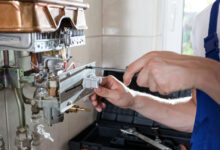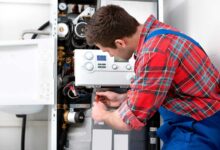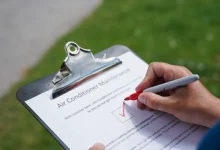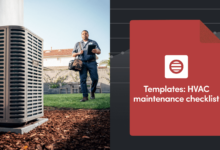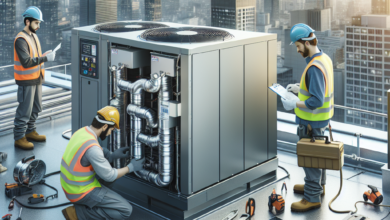HVAC Maintenance Agreement
HVAC Maintenance Agreement – Ensuring the smooth functioning of your HVAC system requires regular maintenance. An HVAC maintenance agreement can provide you with the peace of mind that your system will be routinely serviced and checked for any potential issues. This comprehensive guide will walk you through everything you need to know about HVAC maintenance agreements, from what they entail to the benefits they offer.
When it comes to HVAC maintenance agreements, understanding the components of the agreement is crucial. The agreement typically includes a range of services aimed at keeping your HVAC system in optimal condition. These services often include routine inspections, thorough cleanings, lubrication of moving parts, filter replacements, and priority service in case of emergencies. By having a clear understanding of what is included in the agreement, you can ensure that your HVAC system receives the necessary care and attention it needs to operate efficiently.
The Importance of Regular HVAC Maintenance
Regular HVAC maintenance is essential for several reasons. Firstly, it improves energy efficiency, which can significantly reduce your energy bills. During maintenance visits, HVAC technicians will inspect and clean your system, ensuring that all components are running smoothly. This helps your system operate more efficiently, reducing the amount of energy it needs to heat or cool your home or business.
Secondly, regular maintenance enhances indoor air quality. Over time, dust, debris, and allergens can accumulate in your HVAC system, which can then circulate throughout your space. Routine cleanings and filter replacements remove these contaminants, preventing them from being distributed into the air you breathe. This is particularly important for individuals with respiratory conditions or allergies.
Lastly, regular maintenance extends the lifespan of your HVAC equipment. Just like any other mechanical system, regular wear and tear can take a toll on your HVAC system. By addressing minor issues and performing necessary repairs during maintenance visits, you can prevent major breakdowns and increase the longevity of your equipment. This can save you from the hassle and expense of premature system replacement.
Choosing the Right HVAC Service Provider
Choosing the right HVAC service provider is crucial to ensure that your maintenance agreement delivers the desired results. Start by researching and gathering information about different HVAC companies in your area. Look for providers that have a good reputation, positive customer reviews, and appropriate certifications and licenses.
When evaluating potential service providers, consider their experience and expertise in handling your specific HVAC system type. Some providers may specialize in residential systems, while others may have more experience with commercial or industrial HVAC systems. It’s important to choose a provider that is well-versed in your system’s unique requirements.
Additionally, consider the range of services offered by each provider. Apart from routine maintenance, do they offer emergency services? Can they handle repairs and installations if needed? It’s beneficial to choose a provider that can address all your HVAC needs, ensuring a seamless experience and consistent quality of service.
Lastly, don’t forget to ask for references or testimonials from previous clients. This will give you a better understanding of the provider’s reliability, professionalism, and customer satisfaction levels. By doing thorough research and selecting a reputable HVAC service provider, you can have confidence in the effectiveness of your maintenance agreement.
Evaluating Your HVAC System’s Needs
Every HVAC system is unique, and its maintenance needs may vary based on factors such as age, usage, and manufacturer recommendations. It’s important to evaluate your system’s specific requirements to ensure that the maintenance agreement adequately addresses them.
Start by considering the age of your HVAC system. Older systems may require more frequent maintenance visits to address wear and tear and prevent potential breakdowns. On the other hand, newer systems may have different maintenance needs, such as warranty-specific service requirements. Familiarize yourself with the manufacturer’s recommendations and guidelines for your particular system.
Usage is another crucial factor to consider. If your HVAC system is used year-round or in a high-demand environment, it may require more frequent maintenance to keep up with the heavy workload. Commercial spaces, for example, often have higher occupancy rates and longer operating hours, putting more strain on the HVAC system. Adjust the frequency of maintenance visits accordingly to ensure optimal performance.
Lastly, take into account any specific issues or concerns you may have noticed with your HVAC system. Is it making unusual noises? Does it struggle to maintain a comfortable temperature? Communicate these concerns to your HVAC technician during maintenance visits so that they can address them appropriately.
Frequency of Maintenance Visits
The recommended frequency of HVAC maintenance visits can vary depending on several factors. Climate is one of the primary factors to consider. If you live in an area with extreme temperatures or high humidity levels, your HVAC system may require more frequent maintenance to cope with the demands placed on it.
Another aspect to take into account is the usage of your system. Residential systems typically require maintenance visits annually, while commercial systems may need more frequent visits due to extended operating hours and higher occupancy. HVAC professionals can help determine the optimal maintenance schedule based on your specific circumstances.
It’s important to note that regular DIY maintenance, such as filter replacements and cleaning, should be performed in between professional visits. This helps ensure that your system continues to operate efficiently and minimizes the risk of major issues arising.
DIY HVAC Maintenance Tips
While professional maintenance visits are vital, there are several steps you can take as a homeowner or business owner to keep your HVAC system in good condition between visits.
Regularly changing your air filters is one of the most important maintenance tasks you can do yourself. Clogged or dirty filters restrict airflow and force your system to work harder, reducing efficiency and potentially causing damage. Check your filters monthly and replace them as needed.
Keep the area around your outdoor unit clean and free from debris, such as leaves, branches, and dirt. This ensures proper airflow and prevents the unit from getting clogged. Additionally, regularly inspect the indoor components of your HVAC system, such as vents and ducts, and clean them if necessary.
Pay attention to any unusual smells, sounds, or performance issues with your system. If you notice anything out of the ordinary, contact a professional technician for further evaluation. Catching small issues early can prevent more significant problems down the line.
Common HVAC Issues and Troubleshooting
Despite regular maintenance, HVAC issues may still arise. Understanding common problems and troubleshooting steps can help you identify and address minor issues before they escalate.
One common issue is inadequate cooling or heating. This could be due to a dirty air filter, low refrigerant levels, or a malfunctioning thermostat. Checking and replacing the air filter, ensuring adequate refrigerant levels, and adjusting the thermostat settings can often resolve these issues.
If you notice unusual noises, such as banging, rattling, or squealing, coming from your HVAC system, it may indicate loose components, worn belts, or motor problems. Turn off the system and contact a professional technician to diagnose and repair the issue.
Another common problem is poor airflow. This can be caused by clogged air filters, blocked vents, or issues with the blower motor. Check and clean your filters, ensure vents are not obstructed, and schedule a professional inspection if the problem persists.
By being aware of these common issues and taking appropriate troubleshooting steps, you can potentially resolve minor HVAC problems and avoid unnecessary service calls.
Cost Considerations and Pricing Models
When it comes to HVAC maintenance agreements, cost considerations and pricing models can vary among service providers. It’s important to understand the pricing structure and choose an agreement that aligns with your budget and needs.
One common pricing model is the flat-rate pricing system. Under this model, a fixed fee is charged for each maintenance visit, regardless of the specific services performed. This can be beneficial if you prefer a predictable cost structure and want to avoid any surprises.
Another pricing model is tiered service plans. These plans often offer multiple levels of maintenance, each with its own set of services and associated costs. Higher-tier plans may include additional benefits, such as priority service, discounts on repairs, or extended warranties. Evaluate your budget and desired level of service to determine which tiered plan is the best fit for you.
It’s important to carefully review the terms and conditions of the maintenance agreement, including any potential extra charges or exclusions. Understand what is included in the agreement and what additional costs you may incur for repairs or replacements that fall outside the scope of the maintenance visits.
Maximizing the Benefits of an HVAC Maintenance Agreement
To maximize the benefits of your HVAC maintenance agreement, there are additional steps you can take beyond regular maintenance visits.
Keep detailed records of all maintenance visits and any repairs or replacements performed. This documentation can help track the history of your HVAC system and provide valuable information for future maintenance or warranty claims.
Schedule maintenance visits in advance to ensure timely service. HVAC service providers often have busy periods, especially during peak seasons. By scheduling visits well in advance, you can secure a convenient appointment slot and avoid potential delays.
Stay informed about any changes or updates in your HVAC system. If you upgrade or replace any components, inform your service provider so that they can adjust the maintenance plan accordingly. This ensures that your agreement remains tailored to the specific needs of your system.
Renewing and Revising HVAC Maintenance Agreements
Over time, you may need to renew or revise your HVAC maintenance agreement. This could be due to changesin your service provider or updates in your HVAC system. When it’s time to renew your agreement, take the opportunity to reassess your needs and evaluate the performance of your current service provider.
Renewing Your HVAC Maintenance Agreement
Before renewing your HVAC maintenance agreement, consider whether you have been satisfied with the services provided by your current service provider. Reflect on their professionalism, responsiveness, and overall quality of work. If you have had any issues or concerns, now is the time to address them and discuss possible solutions with your provider.
Additionally, review the terms and conditions of your current agreement. Are there any changes or updates you’d like to make? Perhaps you need to adjust the frequency of maintenance visits or add specific services to better meet your needs. Discuss these modifications with your service provider to ensure that the renewed agreement aligns with your expectations.
It’s also worth considering whether you want to explore other service providers in the market. Request quotes and compare the services and pricing offered by different providers. Remember to take into account factors such as reputation, experience, and customer reviews when making your decision.
Revising Your HVAC Maintenance Agreement
Life is full of changes, and your HVAC system may experience them too. If you’ve made any upgrades or modifications to your system, it’s essential to revise your maintenance agreement accordingly. Inform your service provider about any changes you’ve made, such as installing a new thermostat, upgrading to a more energy-efficient unit, or expanding your commercial space.
Revising your agreement ensures that your service provider is aware of the latest developments in your HVAC system and can provide the appropriate maintenance services. They may need to adjust their inspection checklist, update their knowledge of your system, or recommend additional maintenance tasks to accommodate the changes you’ve made.
If you decide to switch service providers during the revision process, communicate your decision to your current provider and make arrangements for a smooth transition. Provide the new service provider with all relevant information about your HVAC system to ensure a seamless transfer of responsibility.
Ultimately, an HVAC maintenance agreement is an investment in the long-term performance and efficiency of your HVAC system. By understanding the components of the agreement, choosing a reputable service provider, evaluating your system’s needs, and adhering to a regular maintenance schedule, you can extend the lifespan of your equipment and enjoy optimal comfort in your home or business.
Regular maintenance visits, combined with proactive DIY efforts, can help prevent major breakdowns, improve energy efficiency, and maintain excellent indoor air quality. Knowing how to troubleshoot common issues and understanding different pricing models can further enhance the value of your maintenance agreement.
Remember to maximize the benefits of your agreement by keeping detailed records, scheduling visits in advance, and staying informed about any changes or updates in your HVAC system. By renewing or revising your agreement when necessary, you can ensure that it remains tailored to your specific needs and continues to deliver the desired results.
In conclusion, an HVAC maintenance agreement is a vital tool for ensuring the proper care and maintenance of your HVAC system. By investing in routine inspections, cleanings, and tune-ups, you can enjoy improved energy efficiency, enhanced indoor air quality, and prolonged equipment lifespan. Choose a reputable service provider, evaluate your system’s needs, and implement both professional and DIY maintenance practices to make the most out of your maintenance agreement. With proper care, your HVAC system will continue to keep you comfortable for years to come.
